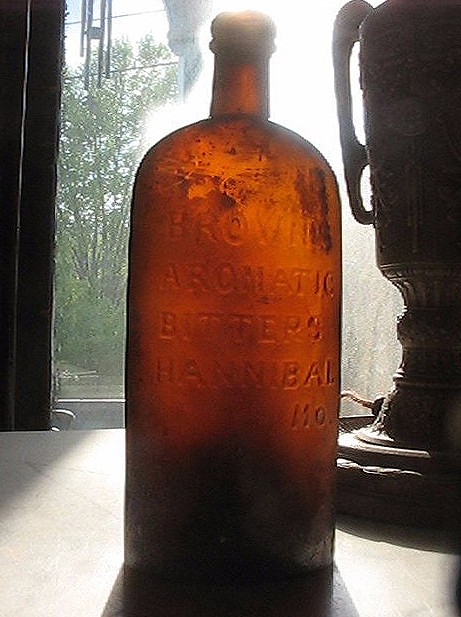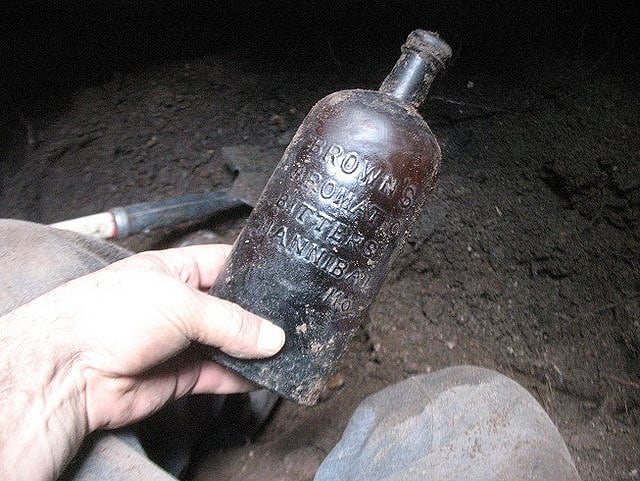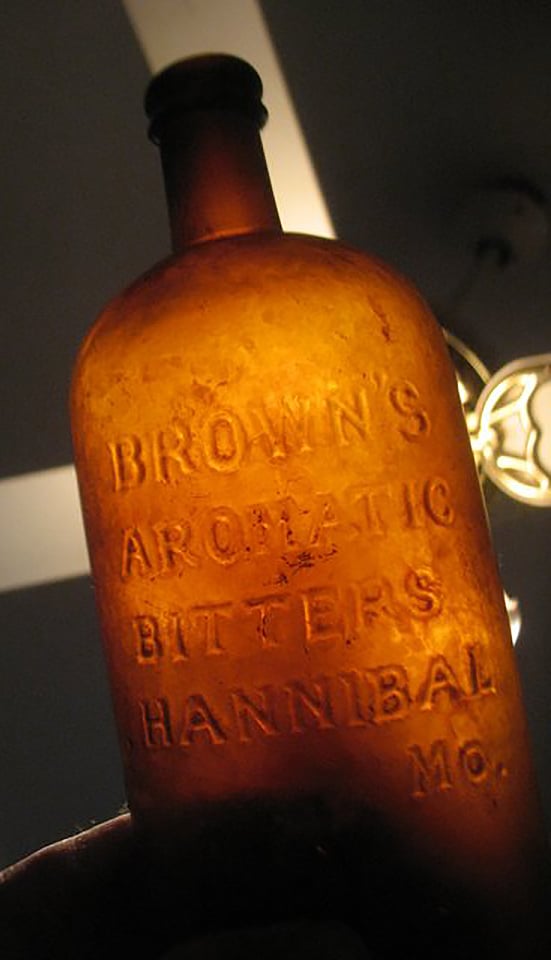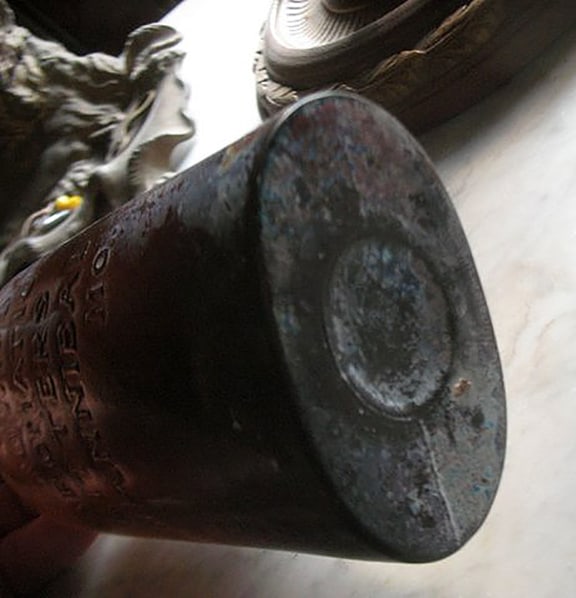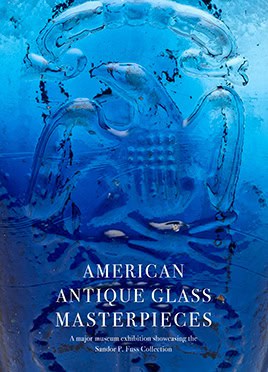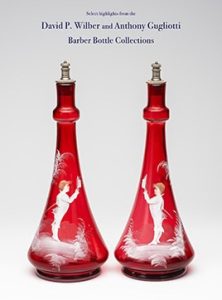A silver lining in that storm?
by Jack Klotz
15 May 2016
Here is the story of finding the elusive “Brown’s/ Aromatic/ Bitters/ Hannibal/ Mo” bottle. I knew they were out there, just never expected to dig one up, as I discovered on the Peachridge Glass web site, the article written about the only other (amber) one known had listed them as “extremely rare.” Only one known and they call it extremely rare??? I call it unique! Well, there are/is at least one, possibly as many as two aqua ones that appear to be a newer variant. Now there are two amber ones. Ferdinand Meyer, president of FOHBC, owns the previously unique example and is nicely pictured in his website article. So now back to mine.
Read: Brown’s Aromatic Bitters – Hannibal, Missouri
I had hunted this property for over a year for the privy vault. The home dated to the late 1850s and was a mansion then as now. The yard is large by Hannibal standards. On the earliest Sanborn map from 1885, as well as the 1890 map, showed a barn in the farthest corner of the yard butting up against the two property lines, leaving no extra room for a privy.
To add to this unlikely area, there was a massive tree trunk about 5-6 feet in diameter that had been toppled over from a 100 mph wind storm a couple of years ago, very near where the barn stood. I checked the tree roots for clues first. Some newer 1940s junk and a few odd bricks were stuck in the tangle of roots in the base and it was obvious the tree literally fell over from its original spot. Next I checked above, from the tree, a ground hogs diggings for clues but found nothing. I used the maps to gauge about where the barn stood and flagged out the four corners and proceeded to probe a tight grid near the borders. Nothing! I discovered well enough away from the barn at the end of an old walkway an overgrown swampy fish pond made from an old large steel barrel. I later drained this out to discover there was nothing it was hiding underneath. I next continued my probing along the back property wall over the months. I couldn’t help but feel I was walking right over it but it continued to elude me.
I pretty well had Swiss cheesed the back part of the yard and after winter set in, mild as it was, I was in no big hurry to return for another bout of frustration. By February, I had decided the unusual warm spell was reason enough to re-probe the property. I decided to make my way closer to the house, as many of these older homes had privies nearly in the middle of the yard. When I got to a certain area, I hit what felt like a wall. I angle probed and it was HUGE! Nearly 10 feet long by 5 feet wide! I was pretty excited. Finally, after long last! But it was not to be. Turned out it was a strange floor of sorts, going down at least 3-4 feet of solid limestone! Not rubble tossed into a pit but well placed like for a floor. But why 4 feet deep? I thought after digging out huge lumps of stone for a couple of feet with no end in sight that it would take a backhoe to remove this! Clearly not the privy but what the heck was it? The homeowners had made mention of the home rumored to have been a prison of sorts during the civil war. Only thing I could come up with was a stockade. They didn’t want them tunneling out! I’m sure it would have worked! So that put me back to square one.
By now, I was beginning to think they just hung their rumps over a fallen log and called it good! “Privy? Privy? We don’ need no stinkin’ privy!” Well, that’s where my mind takes me when this frustrated….
So this most recent attempt started middle of April, of THIS year! Seemed like I been here off and on for years! I stood for a while looking at the yard and kept thinking, “Where is the most logical place for the privy?” It took me back to that corner where the map showed the barn in 1885. I really had no expectations to find anything back there but I had no other viable options. I checked the ground hog’s motel again but nothing. There had always been a large pile of bricks strewn over the edge of the yard that I ignored until now. Mainly because they had remnants of mortar and so far no privy lined with bricks has been mortared in my experience. But they could have been from the privy ABOVE ground. So I began scratching around to the side of the bricks and discovered what looked like a brick wall. then it expanded into two, three, four bricks thick. I’ve seen this on some early rectangular brick cisterns and thought with the barn on top of it, this might make some sense. Soon after, I discovered a stone wall under the bricks! As I uncovered this, I realized I was into a stone liner with a brick outhouse! The four bricks thick part was the foundation for stability for the bricks to be set on top of the stone liner. I had only seen this configuration a handful of times in the past, so now I was getting excited. My privy gauge was at 80%, but I had my doubts still. Why was there a barn on an obviously old stone liner, and what about that tree that looked to be 150 years old sitting right on top of it? Only getting to the bottom of the pit would get me to the bottom of the mystery. After six grueling hours of hacking my way down to the 5 foot level did I quit that first day. I had found one soup bone and that was it! Otherwise it was filled with ash, coal clinkers from furnaces, clay rocks and bricks. Plenty of bricks!
The next day I got there bright and early and got into slingin’ dirt. Soon I was pulling up two, 5 gallon buckets of dirt at a time as there was little room for the dirt to go. By the end of day two, I had only reached the eight foot level with one chicken bone to add to my collection. I gently probed down another four feet without hitting bottom, so I clung to some hope, but it was weak at best.
I ran into my digging friend Sean (Bryan) later that evening by chance and mentioned I found the privy to the elusive yard. He said, “And you weren’t gonna tell me?” I told him he could thank me later as I had found not a shard, a scrap or piece of glass or porcelain in eight feet of hard digging. I did realize if I were to get to the bottom in a reasonable period, I could use some help with the bucket, so I invited him to join the next day if he wanted.
Day three started solo, Sean arrived a couple hours after I did. I had just finished pulling up about 25 buckets from a moderate collapse of the far wall that was going to get knocked down anyway for safety sake. About an hour later I hit the first use layer with any glass in it and pulled out a clear glass un-embossed French square pharmacy type bottle typical of the 1860s. That was promising! Shortly after, Sean arrived and after setting the conditions, he started hauling buckets. In short order, I broke through an 1880s-1890s use layer. Brought up a Warner’s Wine and Tar Syrup, yummy! A couple pumpkinseed flasks with unusually thick glass came out along with a number of one local doctors pharmacy bottles that are only seen in the small 1 ounce sizes. A couple cone inks, including a cobalt Carters popped up. Near the bottom of this layer was a Stafford’s master ink that allowed a photo op.
Up to this point, everything kinda rolled out of the hole. At this point the pit still had at least 4 feet left so I kept digging. Under a layer of bricks was an older 1860s layer. I dug some old pieces here and there, and suddenly I flipped up a bottle that landed in my lap. “Oh! A Warner’s Safe Cure?”, I thought to myself. I turned over the un-embossed side to reveal the embossed side. With one swipe of my glove to remove the clinging dirt, I quickly realized this was no Warner’s! As I read in disbelief, “Brown’s Aromatic Bitters Hannibal Mo” I fell into a mild, warm shock! Sean was watching from above and knew I had found something good, but I had curled up and was cradling it like it was my newborn baby! I kept rocking back and forth and laughing quietly. Sean was concerned about me, I am sure. I had him drop my camera down for as close to an in situation picture as I could make of the bottle fresh out of the hole.
The rest of the day was a blur with me wearing a huge smile. It is amazing what a mood elevator finding a great bottle can be! After I got my hard-earned prize home safely, next was to clean and inspect for any flaws or damage and there were none! The only drawback was managing to tweak my back while on the ladder, and now it was really aggravated. I took all the remedies available with the hopes of finishing out the pit the next day but could barely manage finishing getting out of bed! Rain was forecast for the next three or four days so I needed to return to cover and tarp the pit if nothing else. I managed to hobble over and climb down for a short digging spell before realizing it wasn’t the best of ideas. After covering it up for the bad weather, I, along with my bad back waited for about four days before we simultaneously were ready for my return.
Sitting next to the bitters had been a cathedral pepper sauce in pieces. I was surprised it didn’t survive and break my cherished bitters bottle. That’s how it usually turns out. I dug a number of un-embossed French squares as well as some aqua bluing type bottles. I couldn’t help but wonder where the pontil era stuff was hiding. Just under the 60s stuff was a gooey glue-like clay that held my answer. I dug a couple pontil puff bases, and a broken Ayers Pectoral pontiled, then a second one. This clay layer was the final gasp of the pit, bottoming out at about a foot and a half to the stone floor. Sadly, nothing survived whole at this level, but there were no tears this time around.
I think the mystery of the barn and tree hiding the pit was from an inaccurate map, since there was clearly some 1890s stuff and the tree was likely not as old as I had figured. I am no tree expert so I guess it could have grown that large in 125 years. I just know if not for that storm that knocked the tree over, I would never had found it. There truly was a silver lining in that storm, or perhaps more correctly, a “Brown” lining! I think if I dig nothing else for the rest of the year, all I have to do is remember that bitters in my lap getting its face cleaned by my glove to lift me above any future letdowns. This year……

